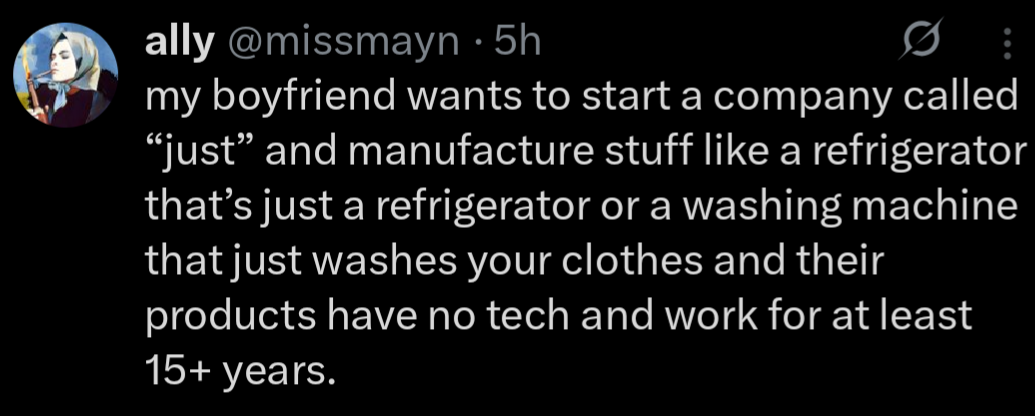this post was submitted on 17 Nov 2025
1213 points (99.1% liked)
People Twitter
8543 readers
2040 users here now
People tweeting stuff. We allow tweets from anyone.
RULES:
- Mark NSFW content.
- No doxxing people.
- Must be a pic of the tweet or similar. No direct links to the tweet.
- No bullying or international politcs
- Be excellent to each other.
- Provide an archived link to the tweet (or similar) being shown if it's a major figure or a politician. Archive.is the best way.
founded 2 years ago
MODERATORS
you are viewing a single comment's thread
view the rest of the comments
view the rest of the comments

It's kind of crazy that like heating air is not perfectly mastered in every stove, heating and pumping water in every dishwasher and laundry machine etc. It's very simple stuff after all.
How fuckin cheap du you have to be to make a non perfect machine 🤷🏻♀️?!
For stoves, the thing that breaks is the control board. Hot + electronics is bad.
An induction stove avoids most of that problem because the hot happens in the pot and not inside the stove.
But I agree, there's not much reason a stove can't last 50 years. In fact, my parents have a 50 year old resistive stove that still works.
Washers have the most to go wrong of things you listed.
The pot is sitting on the stove. And induction involves electromagnetism, which means it involves metal pots and pans, and metal loops of wire to induce current in that cookware. Metal parts conduct heat very well. So, induction stoves don't get quite as hot as conventional stoves. But, they still get very hot because they have a hot metal pot sitting on them.
Also, while induction stoves don't get quite as hot as other kinds of stoves, they involve large currents and large amounts of magnetism. That means both stress on the electrical parts, and mechanical stress from the magnets.
Overall, I'd guess that an induction stove is probably going to have fewer things that can go wrong with it than a gas stove, a glass-top stove or an olde fashioned electrical resistance stove. But, it isn't like an LED light or something that should last decades because there's no moving parts, no heat, no big currents, etc.
Yeah definitely isolate hot things well, it also uses less energy and heats up the surroundings less.
For the washers, maybe but its just like 2 pumps a motor and a control board, it should be simple mechanics to switch those out if they break, IMO.
My burner igniters aren’t electronic-control and they still failed in a less than decade old stove that was not heavily used at all (I live alone and use the stove, not even the specific burners that failed, maaaaaaaaybe monthly)
They just make their parts cheap overall. Induction isn’t enshittification-proof. If anything it’s more susceptible, being entirely electronic.
That said I’d trade my gas stove for induction if I could, even with enshittification.